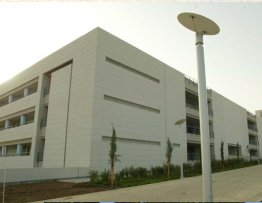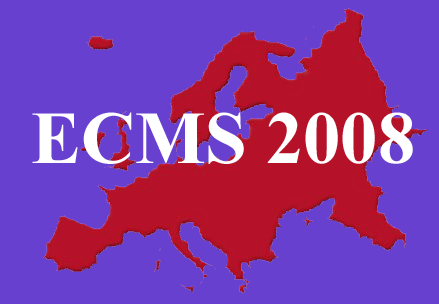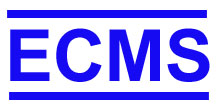22nd EUROPEAN Conference
on Modelling and Simulation
ECMS 2008
June
3rd - 6th, 2008
Nicosia, Cyprus
HPCS
Tutorial III of
Marcos Athanasoulis Dr.PH and Florence Reinisch MPH





"Building Shared High
Performance Computing Infrastructure
for the Biomedical Sciences:
Learnings from Biomed HPC 2007"
by
Marcos Athanasoulis Dr.PH and Florence Reinisch MPH
Harvard Medical School
Boston, Massachusetts
USA
DESCRIPTION
In recent years high performance computing has moved from the sidelines to
the mainstream of biomedical research. Increasingly researchers are
employing computational methods to facilitate their wet lab research. Some
emerging laboratories and approaches are based on a 100% computational
framework. While there are many lessons to be learned from the
computational infrastructure put into place for the physical and
mechanical sciences, the character, nature and demands of biomedical
computing differ from the needs of the other sciences. Biomedical
computational problems, for example, tend to be less computationally
intensive but more "bursty" in their needs. This creates both an
opportunity (it is easier to meet capacity needs) and a challenge (job
scheduling rules are more complicated to accommodate the bursts).
Harvard Medical School provides one of the most advanced shared high
performance research computing centers at an academic medical center. In
2007, Harvard convened the first Biomedical High Performance Computing
Leadership Summit to explore the issues in creating shared computing
infrastructure for the biomedical sciences. We brought together over 100
leaders in the field to exchange ideas and approaches. Through special
sessions and direct participant surveys a number of themes emerged around
best practices in deploying shared computational infrastructure for the
biomedical sciences. Based on prior experience and the summit findings,
this workshop summarizes the approaches and ideas to providing a technical
and process blueprint for organizations wishing to provide shared research
computing research resources for groups small or large - from a few
hundred CPUs and terabytes of data to thousands of CPUs and a petabyte or
more of data.
TUTORIAL OUTLINE
The workshop includes the following topics:
· Summary of the current problems in Biomedical Sciences HPC
o Image Processing
o Simulation
o 'Omics
o Translational Research
· Data Centers and Hardware
o Solving density problems
o Power and cooling strategies
o Blade servers and the multi-core machine
· Deployment Architectures
o Approaches to system imaging
o Supporting fault tolerant applications
o Distributed storage, ready for production use?
o Proprietary interconnects - cost/benefit analysis
o Virtualization
· Job Scheduling
o Approaches to time and resource based queues
o Handling the challenges of parallel vs. distributed
o Integrating "contributed" hardware
· Managing Storage Growth
o SAN vs NAS
o Distributed file systems
o Archiving and near-line storage
o New approaches to compression and de-duplication
· Organizational Challenges
o How to ask for and get seed funding
o Measuring performance and Return on Investment
o Affiliating for group purchasing power
o Workflow and support models
o Working with the ego of the PI
o Setting limits of services
· Putting it into Action
o Online and offline resources
o Communities and colleagues
o Deployment planning tools
TARGET AUDIENCE
The target audience includes any researcher and or research IT core
service provider who are interested in the challenges of providing shared
high performance computing infrastructure to the biomedical sciences. From
the postdoc who needs to set-up a modest compute cluster for their
laboratory to the senior researcher who has been charged with providing
world class infrastructure this tutorial will make them aware of the
foundations and latest challenges of biomedical HPC.
REQUIRED BACKGROUND
While it is expected that tutorial attendees should be information
technology professionals with a basic background in systems deployment and
computer sciences, the session should prove valuable to anyone with an
interest in the challenges and opportunities in creating high performance
computing infrastructure for the biomedical sciences.
DURATION
The tutorial will take two hours. The bulk of the session will be devoted
to the technical challenges and current issues in the field. In the final
part of the session, participants will have the opportunity to present
their plan for their home institution to the tutorial participants.
INSTRUCTOR BIOGRAPHIES
Dr. Athanasoulis is the chair of the Biomedical High Performance Computing
Leadership Summit and Director of Client Services and Research Information
Technology for Harvard Medical School where he oversees the IT service
operations for the school and leads the development of high performance
computing infrastructure to support biomedical and healthcare research.
During his career, Dr. Athanasoulis has worked in both the public and
private sector to improve the quality and efficiency of healthcare and
research through information systems. Prior to joining Harvard Medical
School, Dr. Athanasoulis was the Vice President of Product Development at
RelayHealth Corporation, Inc., where he oversaw the continuing development
and implementation of an advanced patient-provider communication system.
As Chief Technology Officer at HealthCentral.com, he led the development
of health information systems for more than 100 hospitals and health plans
as well as a consumer portal that served millions of consumers. Dr.
Athanasoulis has consulted to a wide variety of health care organizations
including, UC San Diego, the Koop Foundation, the California Department of
Health Services, San Francisco General Hospital, Alta Bates Hospital, the
National Community Pharmacists Association and the UC Berkeley Wellness
Guide. He is also the chief technical advisor for Healia, Inc. and
co-founder of the Healthy Communities Foundation. He holds a master's
degree in epidemiology and biostatistics and a doctorate in health
informatics, both from UC Berkeley where he was a University Fellow.
Ms. Reinisch, is the Program Director for the Biomedical High Performance Computing Leadership Summit. She has more than twelve years of experience designing information systems in the biomedical sector. As program officer for the Healthy Communities Foundation she leads the implementation of a web based indicators project deployed in California and Washing State. She has served as co-investigator on multiple NIOSH -funded projects, including a four year study to evaluate the 1994 CDC Guidelines for the control of nosocomial transmission of tuberculosis risk among health care workers. Ms Reinisch was previously Director for the California Sharps Injury Prevention Program, where she developed a dynamic web application for the program, and served as co-investigator in a three-year CDC grant. She has expertise conducting surveillance and epidemiologic studies in occupational and environmental health, designing data management systems, statistical analysis, project management and web application deployment. She holds a Masters degree in Epidemiology and Biostatistics from University of California, Berkeley.
Page created by M.-M. Seidel Last update 28-02-08.
© Copyright ECMS - All Rights Reserved


